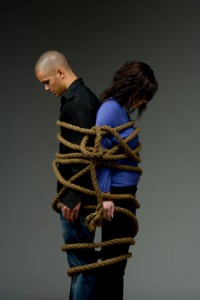 When you find yourself involved with someone who has a ‘toxic’ effect on your mood and state of mind, start by establishing some limits on the relationship. For instance, strive to restrict contact with this person to periods when you:
When you find yourself involved with someone who has a ‘toxic’ effect on your mood and state of mind, start by establishing some limits on the relationship. For instance, strive to restrict contact with this person to periods when you:
- Are in a comfortable environment
- Are rested and relatively unstressed
If the contact becomes unduly stressful, politely break it off. Once this happens a few times, most people (even the toxic types) will moderate their behavior somewhat to keep you from leaving.
Unhealthy Dependence
Troubled people often cling (demand immediate, undivided attention; insist on frequent reassurances of love or loyalty, etc.) as a way of relieving their anxiety. This burns out friends and family who are asked to provide the reassurance.
Allowing someone to cling on a continuing basis actually reinforces their feeling of helplessness. To discourage clinging, remind the person of his/her capabilities, pointing out that clinging is a symptom of emotional problems that should probably be addressed by a professional.
If the person isn’t seeking professional help, ask why not. If that help isn’t working, address the issue of why he/she doesn’t seek help that does work. Your goal isn’t to provide the help, but to get him/her to understand the need for self-help. Offer to assist in finding effective professional help, but make it clear that you’re not the right person to provide psychotherapy.
Return to denial
When a crisis passes, troubled individuals return to a state of deep denial, often insisting that things will be different. Don’t reinforce this by pretending to agree. During periods of denial, confront the individual with reality and the need to seek outside help to forestall future crises.
Recognize and deal with externalization
Externalizing is blaming your behavior on outside forces or circumstances ( including your friends and family ). This permits the troubled person to focus on your problems rather than his/her own. Rather than defending yourself, turn the discussion around by asking “what does that have to do with your drug problem?” or “what does that have to do with the fact that you slashed your wrists last year?” or “what does that have to do with your threatening your parents?” In other words, refocus attention where it belongs.
Learn to deal with aggression
Some people intimidate through temper tantrums or the threat of physical harm to self or others. Adamantly refuse to argue with the troubled person. Just throw up your hands and say, “Hey, I don’t want to fight about this” and walk away. Make it plain that the minute this behavior starts, you are leaving the situation.
Learn to deal with your own misguided feelings of responsibility
The truth is, none of us can really solve someone else’s emotional problems, and even the best advice often turns out to be a a band-aid on some larger issue. No matter how devoted a friend you are, you can’t protect someone from himself on a twenty-four hour basis. So as much as you want to help, you lack the power to effect real change in this person’s life. Besides, you have your own problems to deal with.
Repeat this: “I can’t make him change — only support him if he decides to make the effort. But if he’s not making that effort, then we’re probably both better off acknowledging it.”









